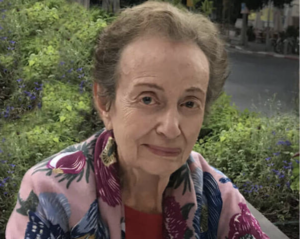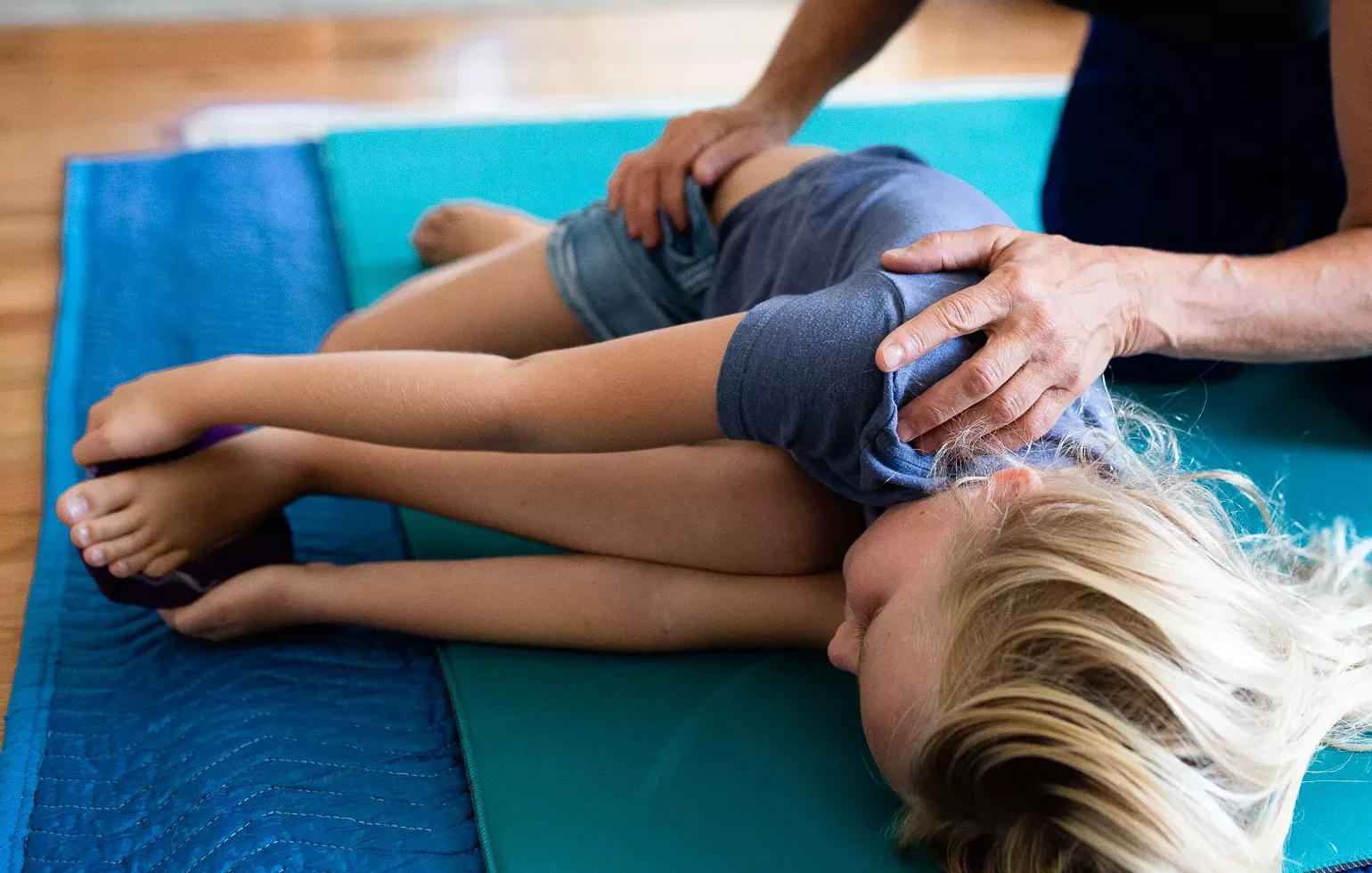



Pati Holman has been a practitioner for 30 years. She works with a full range of diagnoses: from acute injury rehabilitation to complex neurological challenges. While her practice is in Ashland, Oregon, she works with adults and children in settings all around the world. Driven by the desire to inspire children and families to tap into their infinite capacity to learn and improve, Pati used the years of the lockdown to deepen her understanding of the work. She continues to be inspired by the Amherst videos as fundamental source material. Learn more about Pati’s work at her website www.mindmovinglearning.com.
I chose the title for this interview based on how Pati Holman shows up: her conviction in the importance of the Feldenkrais Method comes across with such clarity that anyone who meets her would be impressed with its efficacy.
Gabrielle Pullen: The Feldenkrais method has such broad applications. Lately, because of course the world has changed and how we do things has changed. What do you have in the works?
Patricia Holman: Thank you for asking! I have a workshop coming up for adults in April, as well as a Free Children’s Clinic. It’s an opportunity for parents to bring their children in for a 30 minute lesson.
GP: There was a little discussion in a recent meeting with FGNA members about if it is appropriate to offer free things and there were different opinions about that. But I think it’s appropriate to give people a taste and to make them curious.
PH: As a way to promote my practice, I do offer my services free from time to time. Especially for new practitioners, I think offering free movement lessons or classes is a great strategy. It makes sense to reach out to fellow practitioners and complementary practitioners: people like vision therapists, neurologists, or pediatricians. I sometimes offer free sessions to those people in my network if I know it’s a good fit. I think that people need to be able to experience the work.
GP: Personally, I think that now is a time when Feldenkrais is needed more than ever because we’ve spent these last three years being disembodied; only being able to see each other on videos or zoom. So, if we’re about helping people become embodied, the relevance of the Method has increased. Do you also see Feldenkrais as more relevant than ever before?
PH: You know, I’ve always felt that way. I’ve always felt that the time is now for this work, and that’s maybe why I’m still doing it after 32 years. Something that’s perhaps new since I started my practice is that trauma might have been a topic of conversation in circles of specialty, but now the discussion about trauma informed therapy seems to be everywhere. Attention to this is important when you’re working with people with all the range of issues. I think Feldenkrais is relevant for everyone, always.
GP: Do you agree that perhaps people have experienced some kind of change in identity based on the deprivation caused by lockdowns, masking, social distancing and the difficulties people have endured as an unintended consequence of the pandemic?
PH: The work itself, as Ruthy Alon says, is one of biological optimism. Yet, at the same time, Feldenkrais developed the work around an understanding of the body pattern of anxiety. I know that seems very monotone. But it really covers a broad range, the body pattern of anxiety, whether it’s trauma induced or from some acute experience. We’re always looking at the body pattern of anxiety. On my intake form, I ask about any history of trauma. People will tell me, but often they don’t – if there’s been abuse in the past or alcoholism in the family, or incest, all of these things…I assume that each person’s story is going to contain some kind of trauma. And so I hold an emotional container for it, because I myself have done a lot of shadow work and I understand the importance of acknowledging it. And when you work from the fundamental awareness that the body is not separate from the anxiety, the emotion, the trauma, then there’s no debate that the method is inherently trauma based. The work carries within its principles and application, the operational tools to address it.
GP: Feldenkrais spoke about self image as being affected by the environment that we’re living in, and that it fluctuates and changes.
PH: Let’s talk about Moshe’s history. He grew up in the Ukraine. During the pogroms, his family’s way of life was under assault. His extended family’s way of life was under assault. There was violence, there was death and that is completely analogous to the current era. So, where did he go? He emigrated to Palestine as a young person of 14. Making this arduous and dangerous journey at such a young age says a lot about Moshe and his intensity. And from Palestine he went to Paris for his doctorate. And then another World War begins at his feet and because of his Jewish identity, he escapes Paris to Britain, with another dangerous & harrowing departure. He spent the war years in a Scottish port working for the British Admiralty. An odd juxtaposition to say the least! Then, back to the ‘new’ Israel. To me, this is an extraordinary effort! That so creative a work emerged fully expressed, in spite of it being formed from the soil of tyranny. What an exemplary lesson in resiliency.
His particular way of seeing things is comprehensive, as well as the accomplishment of bringing together the best minds of the previous generations and of his generation to form this very unique therapy or educational system. Feldenkrais was highly creative, and skilled, obviously intelligent but creative. And he never stopped in his in his pursuit of this system, which from a deep internal wisdom, that it needed to be manifested. I think that for me, as a Feldenkrais practitioner, when the tyranny came down on us: “do this, don’t do or say that”, stop practicing in person and go online, losing medical freedoms, or, the states decision to close health facilities, being told my business was nonessential, —-all these dictates, I said, “No. This is an essential business. What I do is an essential business. Not only is it essential for the people who come to me for lessons, but it’s essential for me, in my own wellbeing to continue to practice in person. It’s an essential service.”
GP: It’s certainly essential to me in my wellbeing, why wouldn’t it be essential to the public?
PH: And to practitioners in the NW Region, I want to say, the work will die if we do not do it in
person. It has to be conveyed through the hands, through the spirit, the soul of the person, and this is the essence of Moshe Feldenkrais. We are human beings. Creative human beings in relation to one another. And if we go to an online format, we have taken out the potency of the work. Then it becomes just another thing that you can get online. Is that what we really want to do? No, we want to uphold the method’s potency. So, I think we need more people, like myself and you, Gabrielle, to say, “No, we are not going to stop practicing. We are an essential business. I can’t speak for you, but I’m only going to practice in person.” And that’s what I insisted on.
GP: That certainly speaks to a high level of personal integrity which has been challenged by these past three years. That’s why I believe we need to have a more cohesive region where we as practitioners support each other. How did it work out?
PH: During that period, I did lose some clients. But who didn’t? I used that time as an
opportunity to study more. I used it as an opportunity to work on my website, to do those, let’s say, soft things about my business that lead to more business. I spent time deepening my competency. You see it gave me an opportunity to really dig deeper about why I do the work. It gave me an opportunity to study more. And to read deeply into the biography by Mark Reese, “Moshe Feldenkrais: A Life in Movement”. I continued diving into the Amherst videos that I began in earnest in 2016. I think they are one of the best resources for Feldenkrais practitioners. I was motivated to begin studying them when online Amherst study groups were more numerous, and I found a group to join in with. I participated in group study for 1/2 of the first year of Amherst, and then decided that self-study was more beneficial for me, as the online format was not conducive to nuanced communication. And, I started writing more, which is something that’s always a challenge for
me!
GP: Yes, well, writing, like walking, is something everyone can do, but writing also benefits
from a process of intentional awareness for a time. It’s effective because, like Feldenkrais, it
completes a feedback loop, which is why it also improves learning how to learn more
effectively. I so appreciate your willingness to sit down and discuss these important issues and I appreciate how deeply you think about them! Pati, thank you so much for this wonderful
interview!
__________________________________________________
References
1. The Body and Mature Behavior: A Study of Anxiety, Sex, Gravitation, and Learning, by
Moshe Feldenkrais
2. Image, Movement, and Actor: Restoration of Potentiality by Moshe Feldenkrais, translated
and edited by Kelly Morris (Collected Articles & Interviews with Moshe Feldenkrais, D. Sc.)
__________________________________________________